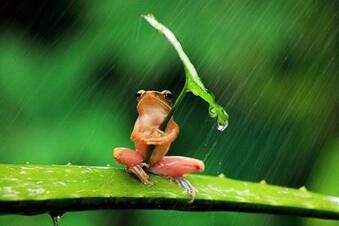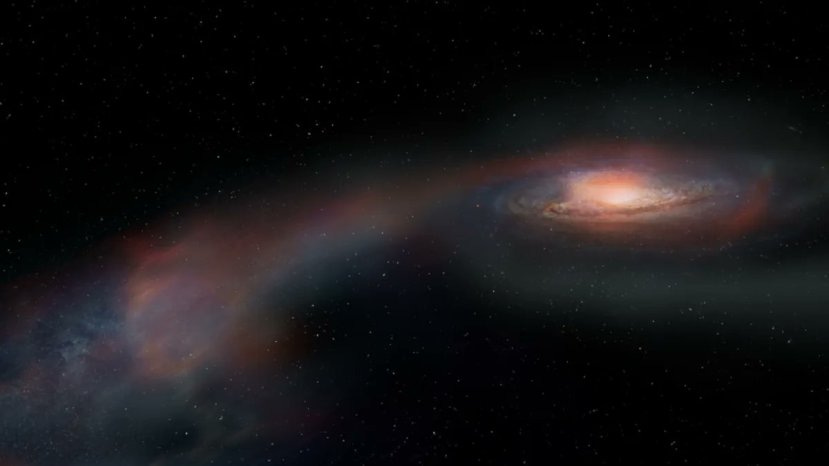You can also listen at YouTube or Spotify.
See this frog?
The “IFL Science” people say that frog is Science. IFL is a juvenile crudity which many in our “culture” think is necessary to make information palatable. Let that pass.
Here’s another picture from the same crew, which they also think is Science.
One more. Not from them, but a common enough picture these days.
That one Science?
If any of these objects are Science, then why are they Science? And if they are not, then why are they not?
It’s easy to see why the IFL crowd think the frog is Science. It’s that it’s unusual—to them. And it is. Unusual. To them. Maybe not unusual to the people who live by where this frog makes a living.
And stars and galaxies are common, aren’t they? Certainly radio tracking devices are. Who goes anywhere without one these days?
We appear to have deduced that if any of these things are Science, or even if they aren’t, then commonality or unusualness can’t be why they are, or aren’t.
Interestingly, the pictures in each case were made by tools. Camera, telescope, and probably another tracking device with an embedded camera. Are those tools Science? Are all tools Science?
You might have heard that there was a new virus going around, helpfully created by people in our and in a foreign government. Since they can be made, viruses can be thought of as tools. So if tools are Science, then that virus is Science.
Which means roads, handkerchiefs, screws, paper, salt, pencils, baseballs, toilet paper, really everything we use is Science. If tools are Science.
We heard that a certain mandated treatment (in some locales) for the man-made virus is Science. Is it? It is if tools are and we consider the treatment a tool. A much more interesting question is this: is the mandate itself Science? Many say so; particularly those doing the mandating.
If this mandate is Science, then which mandates are Science, and which not? A mandate is when an authority, backed by force of law and implied violence, requires certain people follow a rule. It seems unlikely implied violence is Science, which means if a mandate is Science, it must be the rule itself which is Science.
Are all rules Science? Only some? If it’s only some, which? How do we tell non-Science rules from Science rules?
If you pause to think of it, these are forms of the question: is Science the knowledge of right and wrong, good and evil, moral and immoral? Because that’s what rules are: they tell you what is right to do, or wrong, or best or worst; they tell you what act is good, and which evil; and they say which behavior is moral, and which immoral.
If rules are Science, then Science is ethics and morality. It is economics and health. It is the judgement of every act, with no exceptions. This, of course, includes religion. Science is everything.
It seems we have talked ourselves into the position that everything is Science. That can’t be right, can it?
On the other hand, some people say Science isn’t everything, or ethics, or even tools, but it is a method. And not any method—like following a recipe or the guide on how to say the rosary—but a specific checklist which leads to the discovery of new knowledge.
This is confusing, because knowledge can be of many things. Like who were the people present at the signing of the Magna Carta. Or what is Uncle Bob’s favorite donut. Or how many screws grandpa has in the old coffee can. Or any of an infinite list of items. Most of this knowledge is of low, or no, importance. We know that, whatever Science is, it doesn’t take an interest in everything, but only some things.
Before we get to that, what about that famous method? Well, new knowledge is discovered by historians, isn’t it? And even people like lawyers? And don’t poets, painters, musicians, and novelists have important things to say about the human condition? Whether or not these folks use the same famous method, or they use something else, new knowledge is being discovered.
Many claim this method, and therefore Science itself, is self-correcting. What an amazing thing! Science wanders into mistake, error, and ignominy and—somehow—Science just sits there and the method self-corrects these awful departures! Maybe this is why celebrity scientist Neil deGrasse Tyson says “Science is true, whether or not you believe in it.”
But if Science is self-correcting, how can it ever produce a wrong result? It can’t. Unless outside forces, which are not Science, attack it, and weaken it, and insert error into it. Those errors aren’t Science, then, but something else. If Science is self-correcting, then Tyson is right: Science is always true.
Yet if errors aren’t Science and are something else, what are they? Is Science just a list of truths? Well, philosophers, mathematicians, historians, even religions, have lists of truth. Are they all Science? But they all have error, too. Maybe those errors aren’t really philosophy, and so on, just like errors aren’t really Science? So religion is true, whether or not you believe in it?
Here’s what’s strange. How do we know the method has already self-corrected a statement purporting to be Science?
You can’t. So the method itself is not a great candidate for Science, or if it is Science, it is imperfect, and not unique.
But everybody says Science is unique, and amazing, and is nothing like poetry or history. Either Science is everything, like we thought above, or it’s an unexceptional, mysterious method, or it’s something different from all this.
Here, then, is what Science is: discovering the cause of something measured.
That’s it, and nothing more.
Well, maybe not nothing more. We have to understand what cause means, and we have to know what measurements are. Neither are anywhere near as simple as you thought.
Both will turn out to be at times difficult and, at other times, trivial. Certainty can be had in both aspects, or even just one, or neither. That means we have to grasp uncertainty. And since uncertainty is a matter of the mind, we have to figure out the differences between knowledge of things, and of things themselves.
So it’s not a frog that is Science, but the cause of his measured color, and why (because) other frogs don’t have that but other measured colors. Galaxies aren’t Science, but their cause and their measurements are, and neither are certain, either.
Science isn’t tools, but tools are used in measurement, to greater and lesser certainties—what causes tools to work is Science, though.
And Science is not ethics or morality. Science can never tell you what is best or worst to do. No mandate or rule can therefore be Science, which means the people who say they are are either badly mistaken or have ulterior motives.
I haven’t yet proved to you my definition of Science is correct, but I hope you see the other definitions fail. Stay tuned.
Buy my new book and learn to argue against the regime: Everything You Believe Is Wrong.







Mr. Wizard and Mr Greenjeans are science because they were on black and white TV, which was science, brought into our livingroom in the Fifties via a science-based antannae atop a 20 foot tower my Dad erected very scientifically on our asphalt roof. Also, Wizard and Greenjeans were science because they were fascinating, like science, and they talked about science stuff, like laboratory experiments and gardening, using words of science like frog and kangaroo that I could understand if I was wearing my science hat, which was a Pittsburg Pirates baseball cap wrapped in aluminum foil so it would defelect radioactivity away from our Hydrogen Bomb Shelter ( also science) which my Dad built very scientifically after Julius and Ethel Rosenberg were scientifically executed in a science-like electric chair because they gave some secrets of science (also, BTW, "secrets" are science) to the Communists so they could have their own Hydrogen Bomb based on science.
I thought science was the body of knowledge that could be empirically falsified. Poppers criteria. It's still early I am not looking anything up.